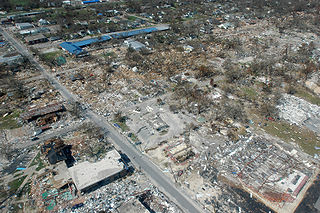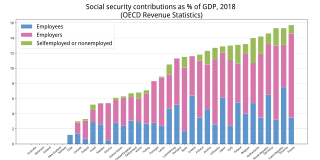| Look up ensure in Wiktionary, the free dictionary. |
Ensure is an American brand of dietary supplements.
Ensure may also refer to:
- Ensure Insurance, a former name of Allianz Nigeria Insurance
| Look up ensure in Wiktionary, the free dictionary. |
Ensure is an American brand of dietary supplements.
Ensure may also refer to:

An actuary is a business professional who deals with the measurement and management of risk and uncertainty. The name of the corresponding field is actuarial science. These risks can affect both sides of the balance sheet and require asset management, liability management, and valuation skills. Actuaries provide assessments of financial security systems, with a focus on their complexity, their mathematics, and their mechanisms.
Medicare may refer to several publicly funded health insurance programs:

Social services are a range of public services intended to provide support and assistance towards particular groups, which commonly include the disadvantaged. They may be provided by individual actors, private and independent organisations, or administered by a government agency. Social services are connected with the concept of welfare and the welfare state, as countries with large welfare programs often provide a wide range of social services. Social services are employed to address the wide range of needs of a society. Prior to industrialisation, the provision of social services was largely confined to private organisations and charities, with the extent of its coverage also limited. Social services are now generally regarded globally as a 'necessary function' of society and a mechanism through which governments may address societal issues.

Financial regulation is a form of regulation or supervision, which subjects financial institutions to certain requirements, restrictions and guidelines, aiming to maintain the stability and integrity of the financial system. This may be handled by either a government or non-government organization. Financial regulation has also influenced the structure of banking sectors by increasing the variety of financial products available. Financial regulation forms one of three legal categories which constitutes the content of financial law, the other two being market practices and case law.

Workers' compensation or workers' comp is a form of insurance providing wage replacement and medical benefits to employees injured in the course of employment in exchange for mandatory relinquishment of the employee's right to sue his or her employer for the tort of negligence. The trade-off between assured, limited coverage and lack of recourse outside the worker compensation system is known as "the compensation bargain". One of the problems that the compensation bargain solved is the problem of employers becoming insolvent as a result of high damage awards. The system of collective liability was created to prevent that, and thus to ensure security of compensation to the workers.
An escrow is a contractual arrangement in which a third party receives and disburses money or property for the primary transacting parties, with the disbursement dependent on conditions agreed to by the transacting parties. Examples include an account established by a broker for holding funds on behalf of the broker's principal or some other person until the consummation or termination of a transaction; or, a trust account held in the borrower's name to pay obligations such as property taxes and insurance premiums. The word derives from the Old French word escroue, meaning a scrap of paper or a scroll of parchment; this indicated the deed that a third party held until a transaction was completed.

National Insurance (NI) is a fundamental component of the welfare state in the United Kingdom. It acts as a form of social security, since payment of NI contributions establishes entitlement to certain state benefits for workers and their families.
Publicly-funded healthcare is a form of health care financing designed to meet the cost of all or most healthcare needs from a publicly managed fund. Usually this is under some form of democratic accountability, the right of access to which are set down in rules applying to the whole population contributing to the fund or receiving benefits from it.
Unemployment benefits, also called unemployment insurance, unemployment payment, unemployment compensation, or simply unemployment, are payments made by authorized bodies to unemployed people. In the United States, benefits are funded by a compulsory governmental insurance system, not taxes on individual citizens. Depending on the jurisdiction and the status of the person, those sums may be small, covering only basic needs, or may compensate the lost time proportionally to the previous earned salary.

Life insurance is a contract between an insurance policy holder and an insurer or assurer, where the insurer promises to pay a designated beneficiary a sum of money upon the death of an insured person. Depending on the contract, other events such as terminal illness or critical illness can also trigger payment. The policy holder typically pays a premium, either regularly or as one lump sum. The benefits may include other expenses, such as funeral expenses.
An intermediary is a third party that offers intermediation services between two parties, which involves conveying messages between principals in a dispute, preventing direct contact and potential escalation of the issue. In law, intermediaries can facilitate communication between a vulnerable witness, defendant and court personnel to acquire valuable evidence. Whilst in barter, the intermediary is a person or group who stores valuables in trade until they are needed, parties to the barter or others have space available to take delivery of them and store them, or until other conditions are met.

The Allstate Corporation is an American insurance company, headquartered in Northfield Township, Illinois, near Northbrook since 1967. Founded in 1931 as part of Sears, Roebuck and Co., it was spun off in 1993. The company also has personal lines insurance operations in Canada.

Social insurance is a concept where the government intervenes in the insurance market to ensure that a group of individuals are insured or protected against the risk of any emergencies that lead to financial problems. This is done through a process where individuals' claims are partly dependent on their contributions, which can be considered as insurance premium to create a common fund out of which the individuals are then paid benefits in the future.
Unitised insurance funds or unit-linked insurance funds are a form of collective investment offered life assurance policies.

Constant proportion portfolio investment (CPPI) is a trading strategy that allows an investor to maintain an exposure to the upside potential of a risky asset while providing a capital guarantee against downside risk. The outcome of the CPPI strategy is somewhat similar to that of buying a call option, but does not use option contracts. Thus CPPI is sometimes referred to as a convex strategy, as opposed to a "concave strategy" like constant mix.
Medibank Private Limited, better known as simply Medibank, is one of the largest Australian private health insurance providers, covering 3.7 million people in 2021. Medibank initially started as an Australian Government not-for-profit insurer in 1976, before becoming for-profit in 2009 and privatised by the Abbott Government in 2014. Medibank now operates as a publicly-listed company on the Australian Securities Exchange.
Tata AIG General Insurance Company Limited is an Indian general insurance company and a joint venture between the Tata Group and American International Group (AIG). Tata Group holds a 74 percent stake in the insurance venture with AIG holding the balance of 26 percent.
The DGCOS is an independent UK regulatory body, whose agenda includes vetting of suppliers, guaranteeing customer access to industry inspectors, and protecting members against unfounded complaints.

Agriculture in India is highly susceptible to risks like droughts and floods. It is necessary to protect the farmers from natural calamities and ensure their credit eligibility for the next season. For this purpose, the Government of India introduced many agricultural schemes throughout the country.
The civil liability of a recreational diver may include a duty of care to another diver during a dive. Breach of this duty that is a proximate cause of injury or loss to the other diver may lead to civil litigation for damages in compensation for the injury or loss suffered.